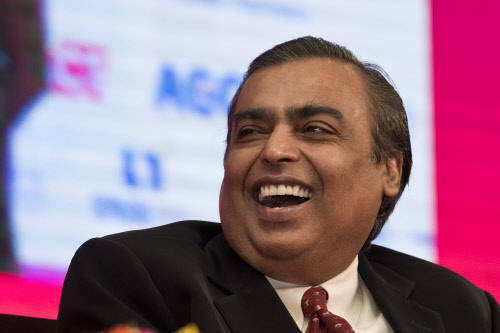
Ahead of Diwali, Mukesh Ambani unleashes e-commerce price war
As India this week hits the peak of its biggest shopping season ahead of the festival of Diwali, billionaire Mukesh Ambani has decided to gain an edge in the country’s increasingly competitive e-commerce space

As India this week hits the peak of its biggest shopping season ahead of the festival of Diwali, billionaire Mukesh Ambani has decided to gain an edge in the country’s increasingly competitive e-commerce space.
And deep price cuts remain his mantra — the tactic that he used to demolished rivals in India’s telecom sector as he sold data plans cheap and offered voice calls for free four years back under the Jio platform.
Ambani’s portals are offering massive discounts of as much as 50% on popular sugary confections and other holiday staples such as spice mixes for India’s rice delicacy, biryani. Meanwhile, his Reliance Digital website is selling some flagship Samsung smartphones at prices cheaper than rivals, with as much as 40% rebates, Bloomberg reported.
Also read: Mukesh Ambani is now world’s fourth richest man, worth $80.6 billion
The move comes as Ambani’s sprawling conglomerate, Reliance Industries Ltd., is flush with cash. After raising an eye-popping $20 billion for its technology venture, it shifted fundraising to its retail arm, which has got over $6 billion in investment in recent weeks from heavyweights like KKR & Co and Silver Lake. Already India’s biggest brick-and-mortar retailer, Ambani’s online ambitions pit him against the two American giants Amazon and Walmart (which controls Flipkart), both of which have invested big in India.
Morgan Stanley estimates that India will generate $200 billion in e-commerce sales by 2026. In retail, Ambani’s firm has a huge edge: government policies favour domestic retailers, of which Reliance is the largest. Since 2018-end, India’s foreign investment rules have also barred Amazon and Flipkart from featuring exclusive products and owning inventory, in a bid to restrict their ability to directly influence prices and offer discounts.
Also read: Amid slowdown, Tier II and III cities drive demand for e-commerce
International companies aren’t allowed to own more than 51% of local brick-and-mortar supermarket chains. Even that limit is subject to conditions such as setting up only in cities with populations of less than one million.
With his local strategy, low-cost procurement and chain of brick-and-mortar stores, Ambani has the ability to shake up online retail, said Siju Narayan, Chief Experience Officer, RexEmptor Consult LLP in Mumbai, Bloombeerg reported. “JioMart can dent the fortunes of grocery e-commerce majors like Bigbasket and Grofers,” he said. Bigbasket and Grofers are the country’s biggest online grocers.
Ambani’s success in telecom shows his ability to benefit from pricing and policy. The government tweaked rules in 2013 to create a “unified licence” that allowed operators with a broadband wireless permit to offer voice calls by paying a one-time fee. Only one operator had such a permit nationwide at that time — Reliance Jio. The new rules helped it move swiftly.
After receiving a unified licence and rolling out Reliance Jio’s telecom services in September 2016, Ambani sold voice and data plans at rock bottom prices. That made digital services more affordable for lakhs of Indians. Although rivals won similar licences, some went bankrupt due to price war, including his younger brother Anil’s Reliance Communications. Non-state operators in telecommunications eventually dropped to three from at least a dozen. Jio turned profitable in 2018. It’s currently India’s biggest wireless operator with over 400 million subscribers.

